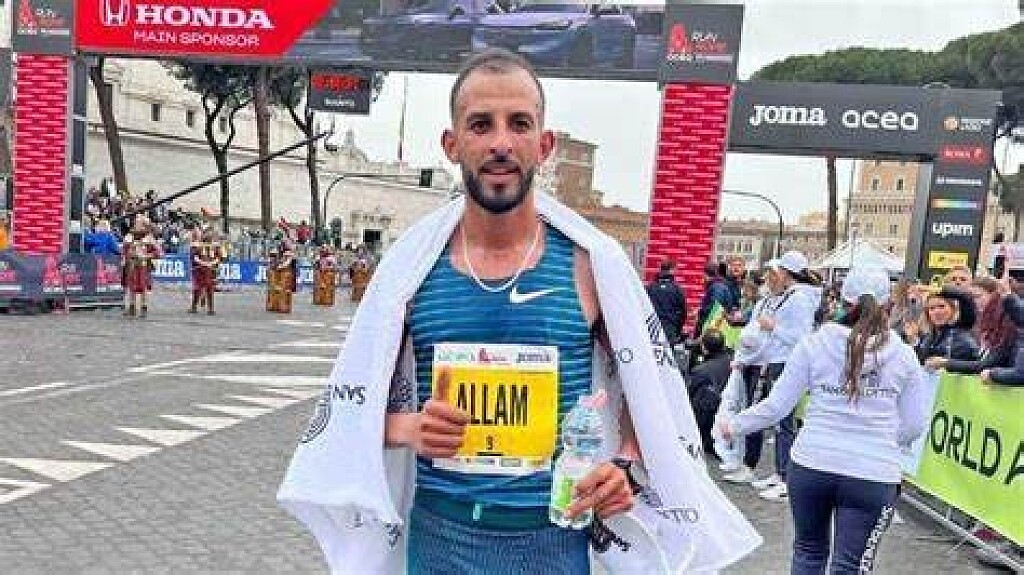Running News Daily
Top Ten Stories of the Week
8/31/2024
These are the top ten stories based on views over the last week.
How To Watch the 2024 Ultra Trail du Mont-Blanc Races
The most-anticipated annual event of the trail running universe takes place from August 26 to September 1
This year’s Ultra-Trail du Mont-Blanc is right around the corner—which means some of the best athletes in the trail-running universe will be meeting up in Chamonix, France, to test their mettle on one of the sport’s biggest stages.
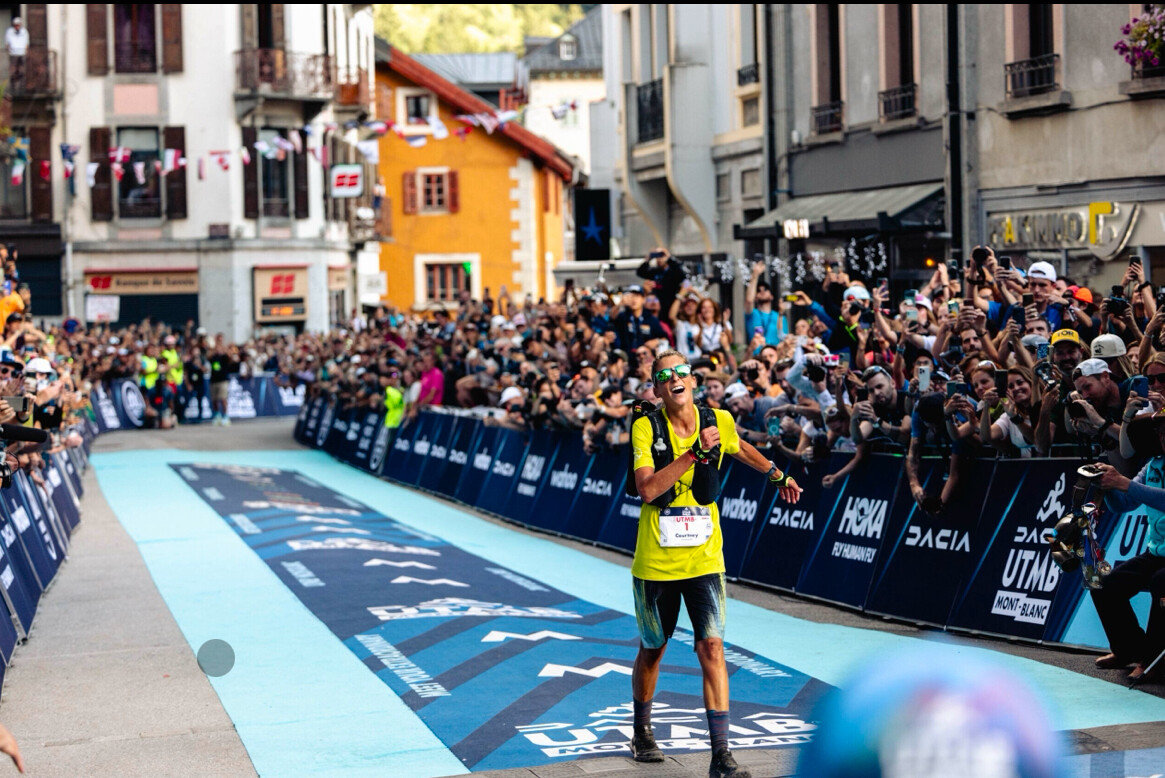
With double the prize money on the line this year, athletes will have more to fight for than ever. And you can get a front seat to the action without leaving home. Here’s how to watch the 2024 UTMB World Series Finals, including the 50K championship, OCC, the 100K championship, CCC, and the grand finale 100-mile championship, the 106-mile Ultra-Trail du Mont-Blanc (UTMB), from August 29-September 1.
What started as a stand-alone race has transformed into a weeklong festival of alphabet soup acronyms. There are eight total races during the week from August 26-September 1, but the three races that make up the official UTMB World Series Final—the OCC, CCC, and UTMB—will all be brought to you via drones, bike and runner follow cams, and non-stop commentary.
Last year, Outside and UTMB World Series teamed up to make it easier to stream the UTMB’s top trail-running events. This year, the partnership continues—which means you can watch 10 of the series’s best events live on Outside TV.
The championships racing action starts on Thursday, August 29 with the OCC as runners start from Orsières, Switzerland (and race the final third of the loop to Chamonix). The action continues straight into Friday morning with the start of CCC in Courmayeur, Italy (which sends runners along two thirds of the loop to Chamonix), and culminates with the crème de la crème, the full-loop UTMB, which kicks off in downtown Chamonix that evening at 6 P.M. local time. The 106-mile race with roughly 32,800 feet of climbing and descending is a time-honored test piece for lifelong ultrarunners, up-and-coming rookies, and elite-level pros alike. For many, it’s the most anticipated trail race of the year.
All three races, OCC, CCC, and UTMB, will be available to watch for free on Outside TV. If you’re sleeping and miss the action live, no sweat. Outside+ members will also be able to watch on demand after the finish anytime, on any device.
(08/24/24) Views: 140Nonbinary Philadelphia Marathon runners can now compete for non-elite open division awards
The City of Philadelphia and Philadelphia Marathon Weekend organizers announced prize money and awards will be given to nonelite and elite nonbinary athletes this year.
The start of the 30th annual Philadelphia Marathon on the Benjamin Franklin Parkway Sunday, Nov. 19, 2023. Men’s winner Benard Kiptoo Koech is wearing bib #3 at center., the Philadelphia Marathon will continue to follow their national governing body guidelines that excludes nonbinary participants from elite runner awards.
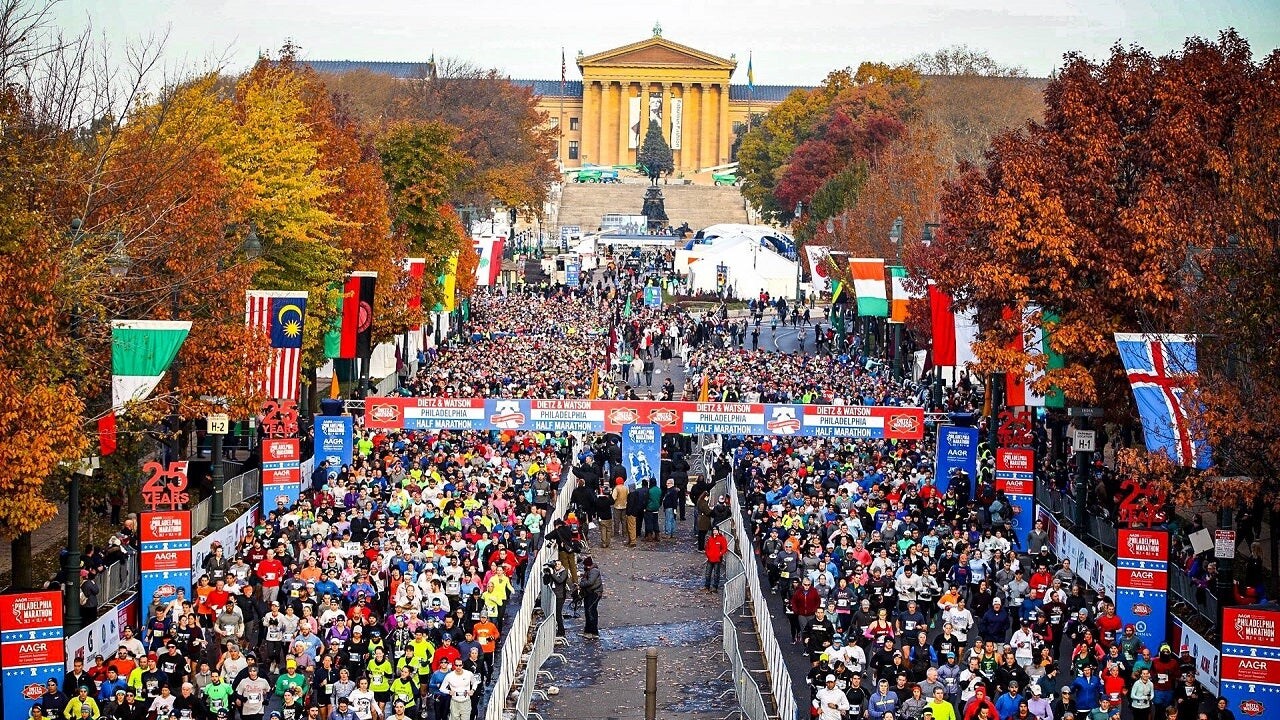
However, organizers have announced new prize opportunities for non-elite runners in all gender divisions.
Previously, only the “first Philadelphian” and the “first Masters” were awarded prize money across genders. The new policy will allow all non-elite runners, including nonbinary participants, to sign up as their authentic selves and compete for prize money as top finishers in the full marathon, half marathon, and 8K races.
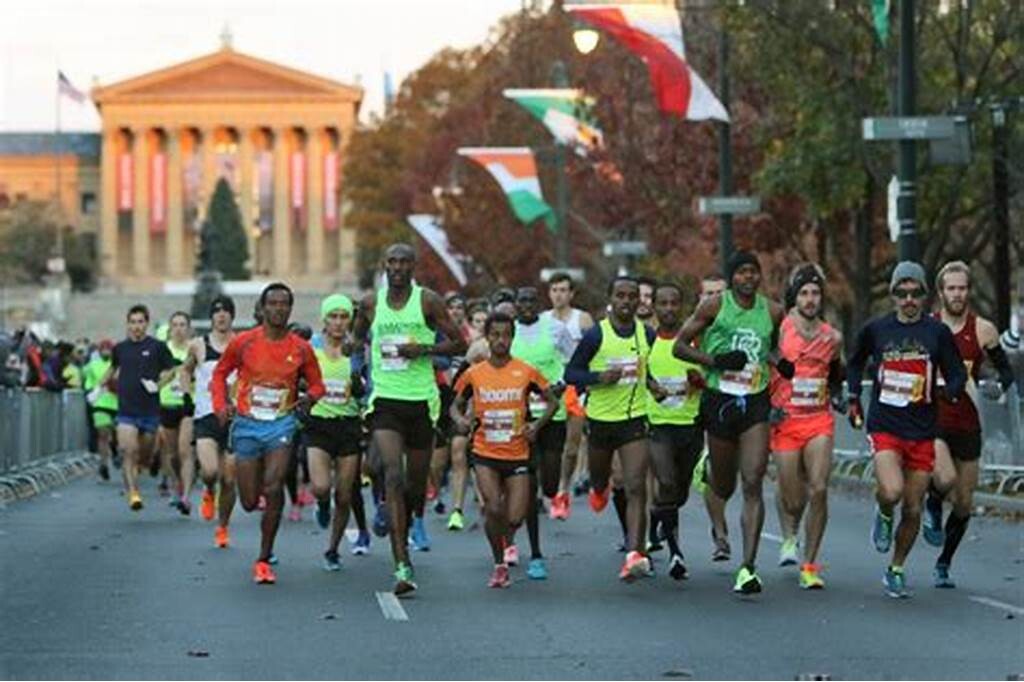
Organizers are also implementing a “face-value approach” to monitoring all gender categories, allowing runners to select their gender identity without additional documentation.In previous years, open division runners did not have to provide evidence as no prizes were awarded. Elite-level runners, however, must still provide supporting evidence such as ID verification and drug testing for testosterone and hormone levels, in line with USA Track & Field guidelines.
Elite participants, who are at the top of their field, receive free registration, prime starting positions, and may be eligible for complimentary travel, hotel accommodations, and larger prize purses. Runners qualify as elite by meeting standard times set for their division in previous races. Prize money for elite runners can reach several thousand dollars.
(08/23/24) Views: 134PhillyDailyNews
'What has he done to deserve it?' - Why Noah Lyles will not put up his Olympic gold medal in prospective challenge against Tyreek Hill
Lyles has dismissed the idea of betting on his gold medals as well as Hill's NFL rings, citing he is "not interested" as the war of words between the two over who is faster continue.
American sprint sensation Noah Lyles has firmly declined the idea of using his Olympic gold medal as a wager in a potential race against NFL star Tyreek Hill.
Lyles, who recently clinched the gold in the 100 meters at the Paris Olympics, is open to racing Hill, but only on his terms—over the 100-meter distance, widely recognized as the definitive race for determining the fastest man on the planet.
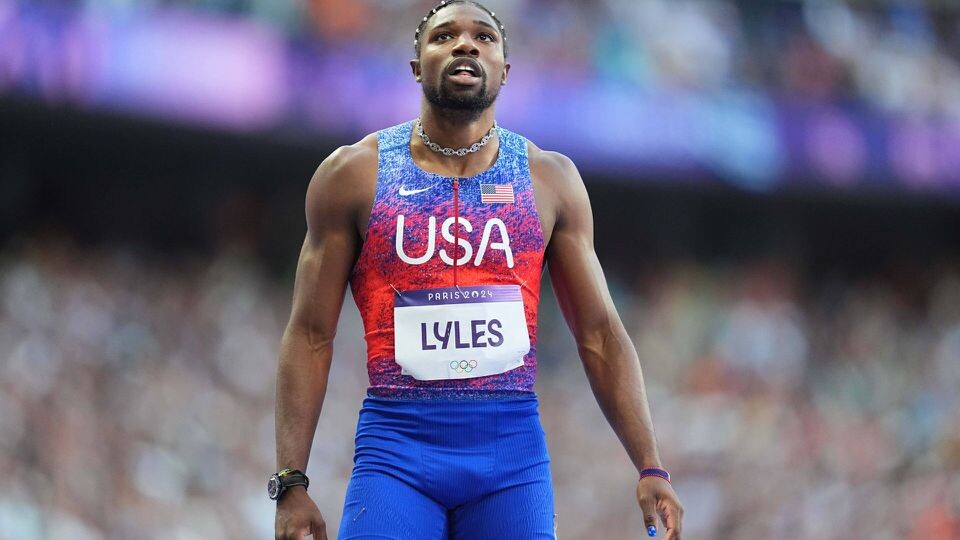
The public feud between Lyles and Hill began after the Miami Dolphins wide receiver took aim at Lyles over comments he made in 2023, criticizing American sports leagues for referring to their champions as "world champions."
Hill, in an interview with Kay Adams, was quick to dismiss Lyles’ opinion, especially after the sprinter’s bronze medal finish in the 200 meters, where he tested positive for COVID-19 after the race.

“Noah Lyles can’t say nothing after what just happened to him,” Hill said during the podcast. “Pretend like he’s sick, I feel like that’s horseradish. So for him to do that and say that we’re not world champions of our sport, come on, bruh. Just speak on what you know about, and that’s track.”
Hill later escalated the tension by challenging Lyles to a 50-yard dash, boldly claiming he would come out on top. “I would beat Noah Lyles,” Hill asserted. “I wouldn’t beat him by a lot, but I would beat Noah Lyles.”
Lyles, however, was unimpressed by Hill’s challenge and made it clear during a Wednesday interview on the Dan Patrick Show that his Olympic gold medal is off the table.
“What has he earned to deserve that status?” Lyles asked rhetorically. “He plays football and is a great football player, but you do not get to jump the line because you think you are fast. There are tons of those people out there.”
When asked if he would be interested in one of Hill’s NFL rings as a wager, Lyles was dismissive. “I do not want a Super Bowl ring. I am very content with my Olympic medals,” he stated.
Lyles also doubled down on the conditions for any potential race, stating that it would have to be in the 100 meters or not at all. “Again, I’m not here to do gimmicks,” Lyles told NBC News. “You want to challenge me, ‘the world’s fastest man,’ if you want to challenge that, you have to challenge that in his event.”
Lyles further referenced NFL wide receiver DK Metcalf’s attempt to compete in the 100 meters, noting that Metcalf had the courage to face sprinters on the track in a legitimate event.
In May 2021, Metcalf ran the 100 meters in 10.36 seconds at the USATF Golden Games and Distance Open, finishing ninth in his heat. While he didn’t qualify for the Olympic Trials, Metcalf’s effort was praised by Lyles as a serious attempt to prove his speed.
“Any time someone fast comes up, he would try to race them. If he really wanted to race people, he would’ve showed up like DK Metcalf,” Lyles said in a separate interview on Night Cap.
“The man [Hill] dodges smoke. I don’t got time for that. He’s challenging me. We’re racing in the 100, we can race. If he’s truly serious about it. If he’s truly serious about it, and I’m not talking about you’re just talking on the internet … you’ll see me on the track.”
(08/23/24) Views: 126Mark Kinyanjui
In His First 100-Miler, David Roche Demolishes the Legendary Leadville 100 Course Record
Matt Carpenter’s record stood for 19 years.
In his first 100-mile race of his career, trail runner and coach David Roche took down a legendary record in the sport. On Saturday, the 36-year-old broke Matt Carpenter’s storied Leadville 100 course record from 2005, winning in 15:26:34—over a 16-minute improvement of the record.
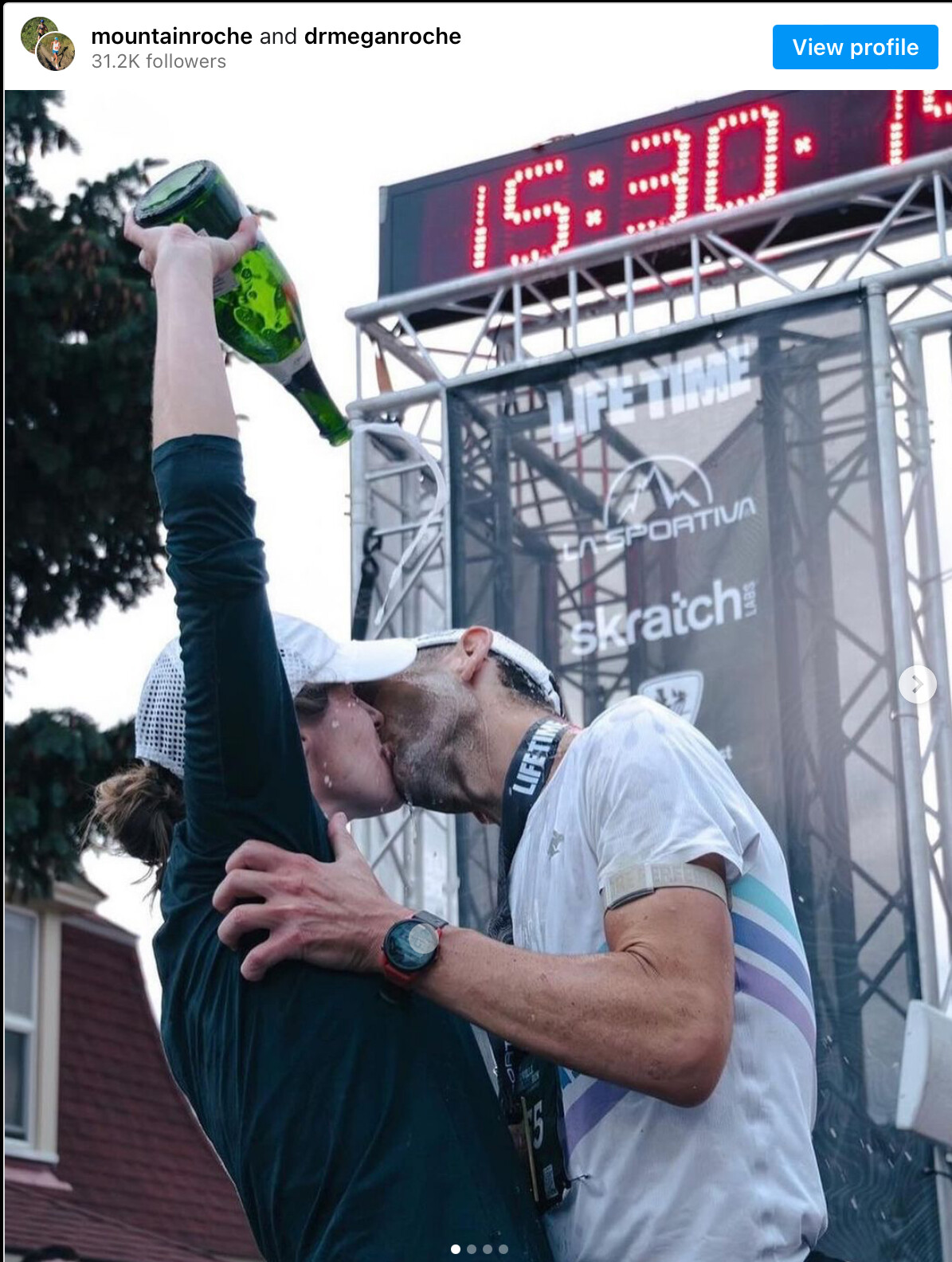
Roche won the men’s race by 30 minutes, on the dot. Adrian Macdonald was second in 15:56:34, and Ryan Montgomery placed third with a time of 16:09:40. In the women’s race Mary Denholm dominated, winning in 18:23:51. Zoë Rom took runner-up honors (21:27:41) while Julie Wright rounded out the podium in 21:48:57.
The Leadville course is notoriously difficult, primarily due to its situation at high altitude. The town of Leadville, Colorado—where the race starts and ends—sits at 10,119 feet above sea level. The “Race Across the Sky” covers more than 18,000 feet of vertical gain and at its highest point, runners reach an elevation of 12,600 feet. (For context, “high altitude” is generally considered to begin around 5,000 feet above sea level.)
Roche went out aggressively and built a sizable cushion on Carpenter’s record of 15:42:59. At the halfway mark, Roche was ahead of course-record pace by over 25 minutes, according to iRunFar. By the 87.4 mile split, the gap had decreased to 15 minutes, but it was enough of a buffer for Roche to maintain.
After the race, Roche posted on Instagram recapping the feat and noting some prerace nerves.
“I put a big scary goal out there early this year: chasing the historic 15:42 Leadville 100 course record by one of the GOATs, Matt Carpenter,” he wrote. “Approaching my first 100 miler, though, I’m not sure I truly believed. I kept joking about where I’d drop out and what my order would be at the Leadville Taco Bell.”
While Roche is an accomplished trail runner, he’s historically had the most success at shorter distances, like the half marathon and 50K. In 2014, he was named the 2014 USATF Sub-Ultra Trail Runner of the Year, and he’s represented Team USA internationally.
Roche, along with his wife, Megan, are well-known in the running community for their coaching business and podcast: Some Work, All Play (SWAP). According to its website, SWAP’s professional roster includes athletes like mountain running world champion Grayson Murphy, three-time Barkley Marathons finisher John Kelly, and steeplechaser/mountain runner Allie Ostrander.
(08/24/24) Views: 126Three fast and furious workouts to do anytime, anyplace
These simple sessions will eliminate your excuses and help you keep your training on track, no matter where life takes you.
No track? No problem. Whether you’re facing a jam-packed work schedule, are on a business trip or simply don’t feel like logging long training hours, these three running sessions are your new go-tos. Put these in your pocket and pull them out anytime, anywhere.
1.- Fit-it-in fitness

Need something that packs a punch, but won’t put you out hours of training?
Warm up with 5 minutes of easy running.

Run 7-10 repeats of 1 minute fast, 1 minute medium-hard. Think 5K effort on the hard sections, with the recovery minutes just slightly faster than your easy pace.
Cool down with 5 minutes of easy running.
2.-The tempo trot
Alternate between tempo pace (a “comfortably hard” pace—this boosts your anaerobic threshold, so your body adapts to performing comfortably at a higher intensity) and easy pace to keep things interesting here.
Warm up with 10 minutes of easy running.
Run 3 minutes at a comfortably hard pace followed by 2 minutes at an easy pace; repeat for 25 minutes.
Cool down with 5-10 minutes of easy running.
3.- Fix-it-and-forget-it fun
These focused intervals will boost mental strength and resilience, while improving your ability to kick it up a notch on tired legs.
Warm up with 5-10 minutes of easy running.
Run 5-10 x 3 minutes at 10K effort, with 1 minute of easy recovery. Focus on staying consistent throughout all intervals.
Cool down with 5-10 minutes of easy running.
Tackle these workouts on any surface, and feel free to increase or decrease the number of intervals, depending on your ability. Remember to follow a harder training day with a rest day or an easy running day.
(08/24/24) Views: 119Keeley Milne
How much do Olympic champions get paid?
Newly-crowned Olympic champions from Paris 2024 don’t just win bragging rights–national Olympic committees (NOC) or national governments from around the globe reward the achievements of their star athletes with a cash prize.
With the expenses that go into being an elite athlete, these funds can go a long way in supporting their athletic endeavours and encouraging further successes in sport. The prize pot isn’t standardized between countries, so how much they earn is highly dependent on the athlete’s nationality.
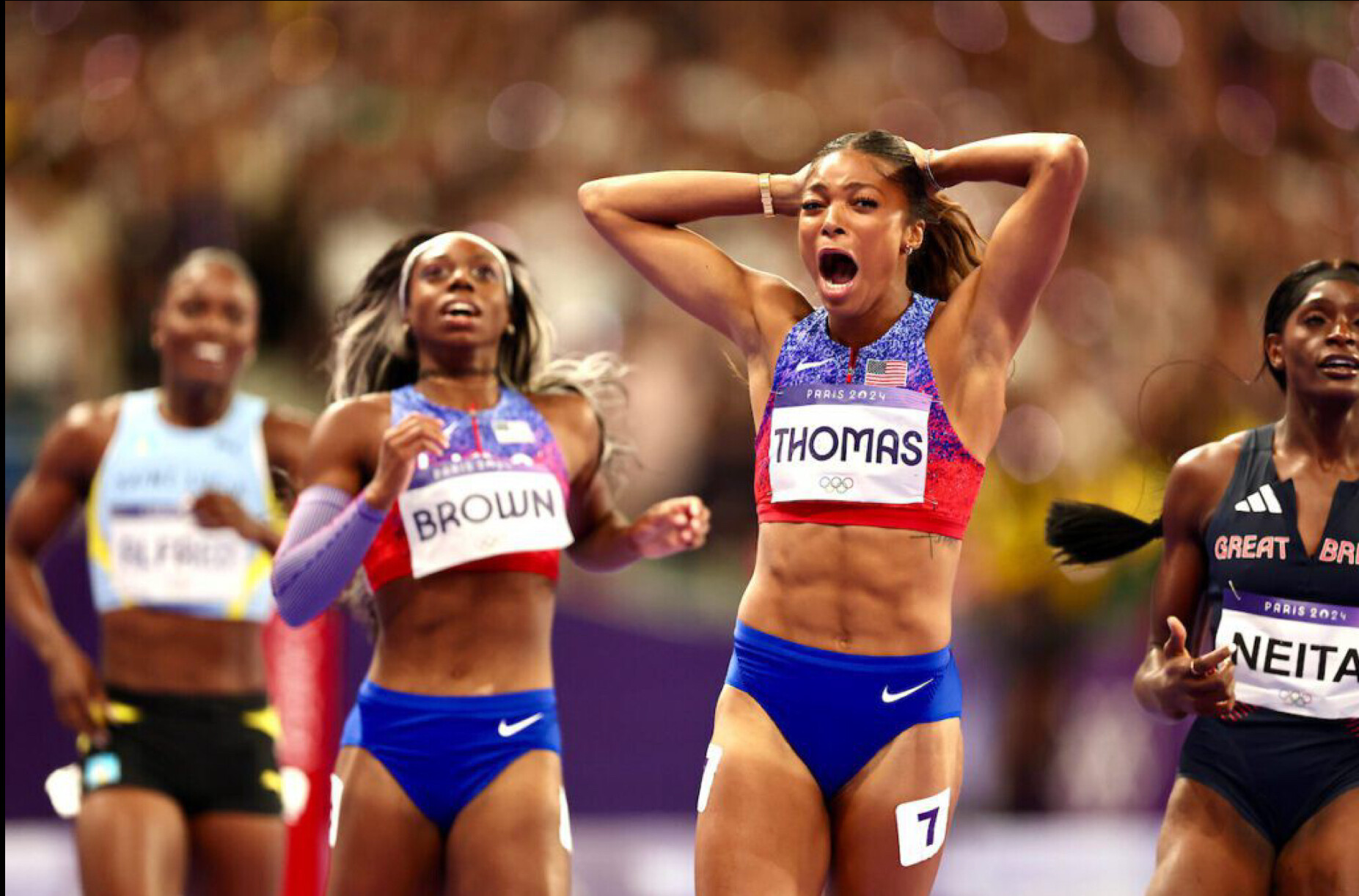
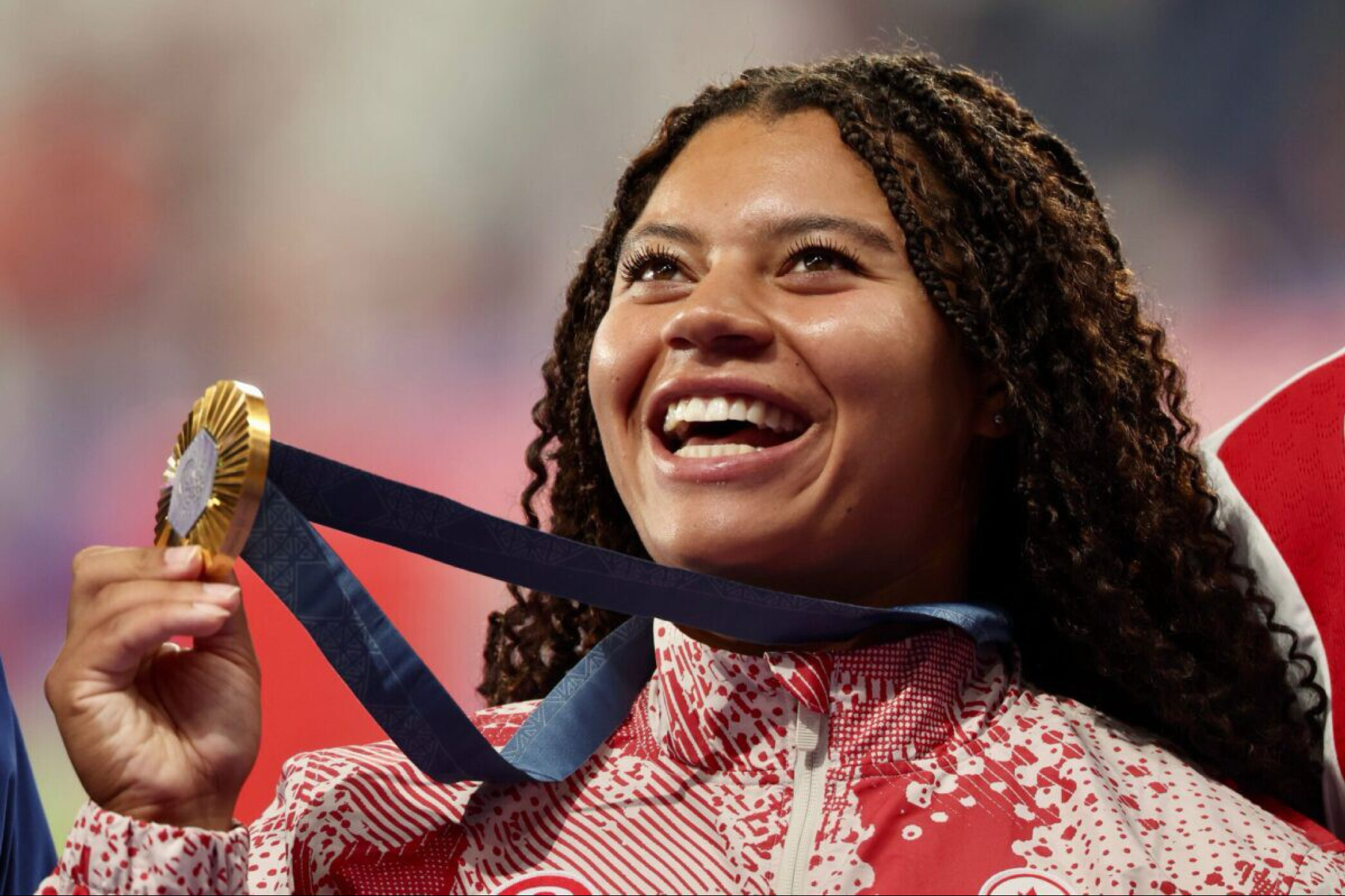
In Canada, an Olympic gold medallist is rewarded CAD 20,000 through the Canadian Olympic Committee’s Athlete Excellence Fund. The same achievement pays significantly better across the border–Team USA’s NOC offers CAD 47,100 to their champions from Paris 2024. Other nations present athletes with prizes other than cash, such as livestock, property, services, cars or food.
Nations like Botswana, which saw their first Olympic gold medal in history in Paris, acknowledge the significance of the monumental achievements to the development of sport and accessibility of resources in the country–going as far as giving the entire nation a half-day holiday on Aug. 9 to celebrate their newly-minted 200m Olympic champion, Letsile Tebogo.
For the Paris 2024 Games, World Athletics became the first international governing body to compensate Olympic champions with a cash prize, promising the first-place finishers in each track-and-field event a whopping USD 50,000 (CAD 68,172) to take home alongside their gold medal and nation’s prize pot. Some countries, such as the United Kingdom, Norway and Sweden, offer no reward for their athletes who bring home an Olympic gold medal
(08/25/24) Views: 116Out of this world!
Jakob Ingebrigtsen obliterates the 3000m world record at the Memoriał Kamili Skolimowskiej with 7:17.55.
He goes more than 3 seconds faster than the previous world record!
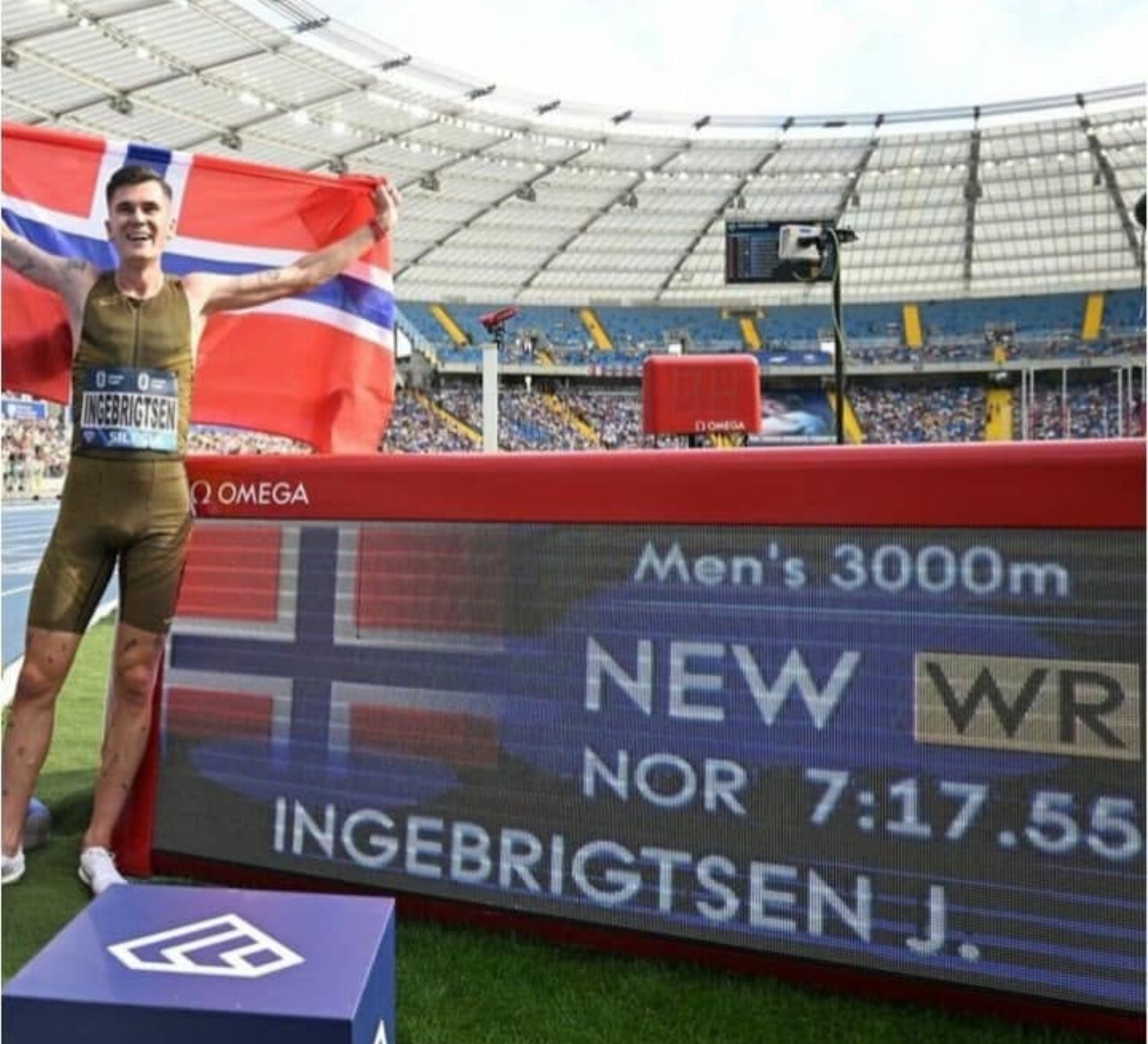
Norway’s Jakob Ingebrigtsen shattered the world 3000m record in the Silesia Diamond League on Sunday (25) afternoon with 7:17.55 to become the first athlete in history to break the 7:20-barrier for the seven-and-a-half lap distance.
The Olympic 5000m champion slashed more than three seconds off the previous mark of 7:20.67 which had stood to Kenya’s Daniel Komen since 1996, the longest standing world record in an individual men’s track event.
But the 23-year-old Norwegian took the record into uncharted territory, churning out the last two laps in 57.46 and 55.47 respectively - 1:52.93 for the last 800 metres - to break away from Ethiopia’s Berihu Aregawi and take a significant chunk of 3.12 seconds off Komen’s enduring record.
“It feels special, amazing. I was hoping to challenge the world record here but based on my training, I can never predict exactly what kind of time I am capable of. I would not have imagined I could run 7:17, though,” said Ingebrigtsen.
. “I would not have imagined I could run 7:17, though. At the beginning the pace felt really fast, but then I started to feel my way into the race and found a good rhythm.
“[The] 3,000 is a tough distance,” continued Ingebrigtsen. “After four-five laps you feel the lactic acid, but you need to get going. The conditions were difficult with the heat today, but it is the same for everyone. Now I want to challenge world records at all distances, but it is one step at a time.”
He finished ahead of a trio of Ethiopians, with the Paris Olympics 10,000m silver medallist, Berihu Aregawi. second in a personal best and the third-fastest time in history (7:21.28). Yomif Kejelcha was third.
Three days ago, the Norwegian had exacted a small measure of revenge over the American Cole Hocker by winning the men’s 1500m in Lausanne in 3:27.83, two weeks after Hocker shocked the Olympic field to win gold in Paris.
He won $50,000 for setting the record.
(08/25/24) Views: 112Winner of 2022 Dublin Marathon tests positive for banned substance
The winner of the 2022 Dublin Marathon, Taoufik Allam of Morocco, has tested positive for the banned performance-enhancing drug EPO.
Allam, 35, has been provisionally suspended by the Athletics Integrity Unit (AIU), which runs the sport’s anti-doping system, his case included on the AIU’s list of pending cases, with his violation dated 16 August and stating: “Presence/Use of a Prohibited Substance (EPO)”.
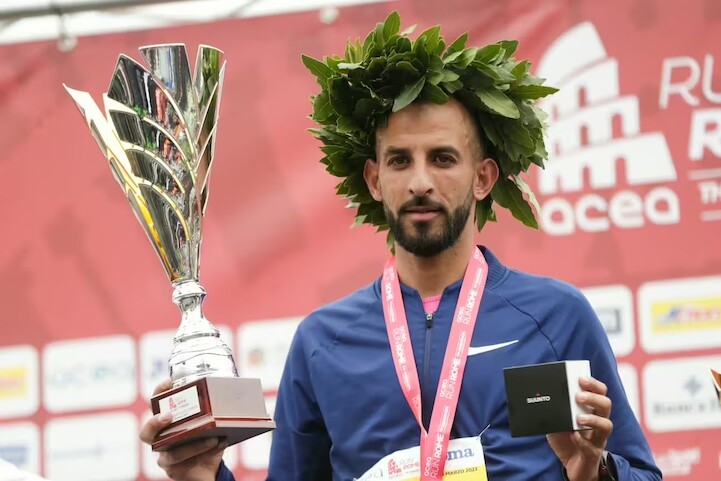
Synthetic erythropoietin is a banned drug that increases the body’s production of red blood cells, thereby improving its oxygen-carrying capacity. Allam can contest the charge and request to have his B sample tested to confirm the finding.
It marks the second time in recent years that the winner of the Dublin Marathon has been engulfed in a doping controversy, with Morocco’s Othmane El Goumri winning in 2019 after returning from a two-year ban for irregularities in his biological passport, a tool used by anti-doping authorities to track changes in athletes’ blood profiles for signs of doping.
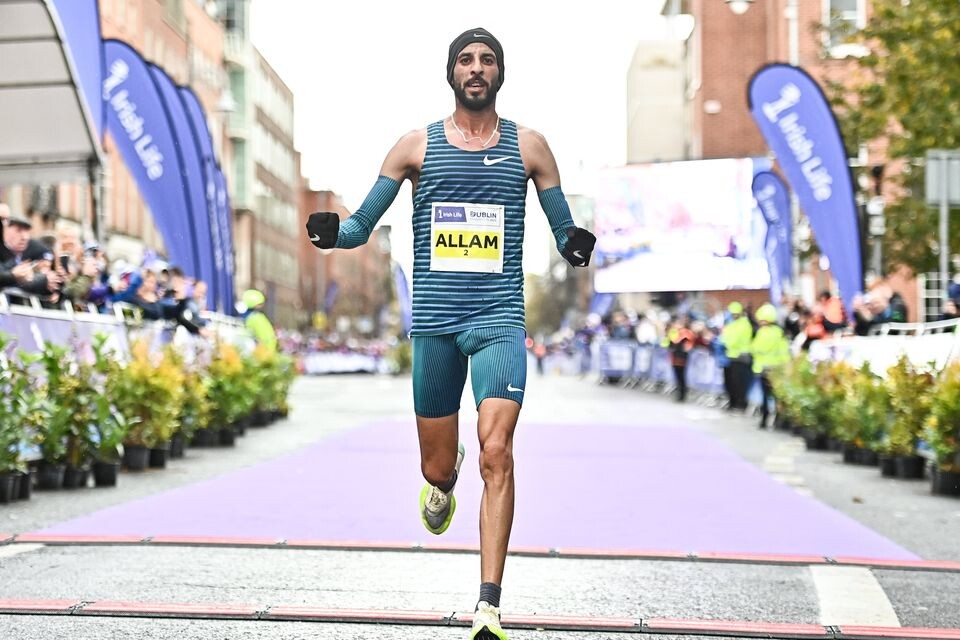
The organisers of the Dublin Marathon have a policy not to invite athletes who have served doping bans, but only became aware of El Goumri’s past after the invitation had been sent out and his flights booked for the 2019 race. Longtime race director Jim Aughney said at the time: “He slipped through the net with regards to us accepting his entry in the first place, but it will be part of the contracts from now on, for any athlete.”
In 2019, a little over a year after returning from his doping ban, El Goumri set a personal best of 2:08:06 to win the first prize of €12,000 in Dublin, demoting Ireland’s Stephen Scullion to second.
“Arguably I might have won the thing if he wasn’t here,” said Scullion. “I feel like a winner inside, that’s a victory for me. I’ve always taken a stance that drug cheats can do whatever they want, I can’t control it.
"I want to enjoy my moment, and in six or nine months’ time if he gets done for another doping violation, then I’m the champ. If the crowd want to believe I’m the champ, let them say. And when the room goes dark at night, I go to bed content knowing I’m clean.”
Allam is represented by the same management company as El Goumri. In the 2022 edition, Allam routed the field to win the men’s title, clocking a PB of 2:11:30 to come home almost two and a half minutes clear of the Ethiopian runner-up, Ashenafi Boja. The leading Irish finisher that year was Martin Hoare of Celbridge AC, who was seventh in 2:20:22.
Allam had no doping history before lining up in Dublin but faces a four-year ban if his positive test is confirmed in follow-up testing. Given the timing of the case, it would still not affect the outcome of the 2022 race, where Allam pocketed a €12,000 first prize. He has since gone on to take victories at the 2023 Rome Marathon in 2:07:43 and the 2024 Enschede Marathon in 2:08:53.
(08/23/24) Views: 111Cathal Dennehy
Why David Rudisha believes Emmanuel Wanyonyi is destined to break his 800m world record
Wanyonyi got to within an eighth-hundredth of a second away from equalling David Rudisha's 12-year 800m world record at the Lausanne Diamond League classic on Thursday.
When David Rudisha tipped Emmanuel Wanyonyi as the athlete most likely to break his 12-year-old 800m world record during the Kenyan trials for the Olympic Games at Nyayo National Stadium last June, it wasn’t just a casual remark.
Rudisha’s prediction is now gathering weight, especially after Wanyonyi clocked a blistering 1:41.11 at the Lausanne Diamond League meet in Switzerland on Thursday.
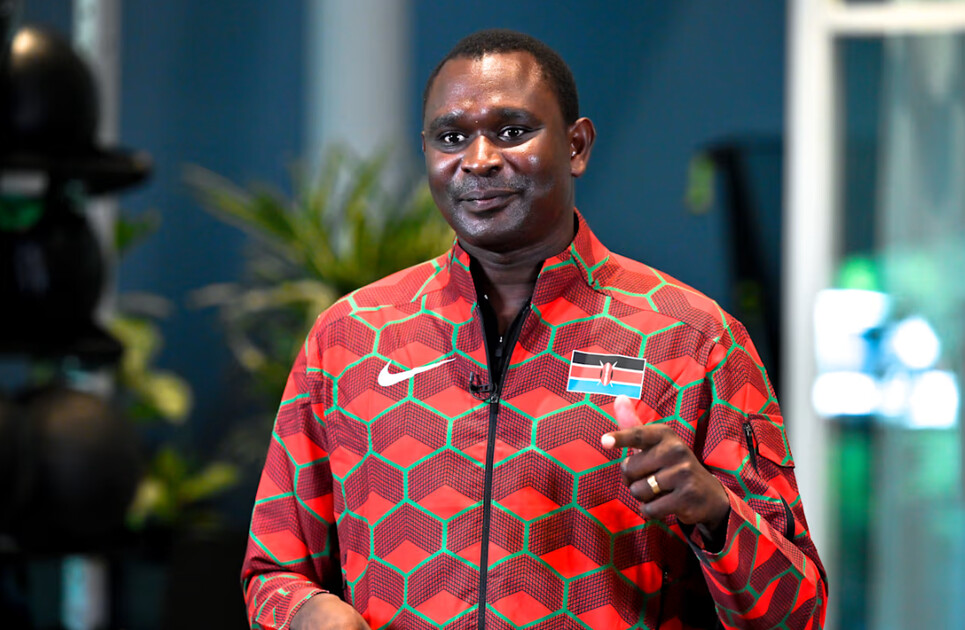
This time not only equaled Wilson Kipketer’s record but also placed Wanyonyi second on the all-time list, just eight hundredths of a second away from Rudisha’s world record of 1:40.91 set at the 2012 London Olympics.
“Wanyonyi is a young talented athlete. He has so much potential, and all he needs to do is fine-tune his craft, and this will see him push his time even lower,” Rudisha had told the media last June.
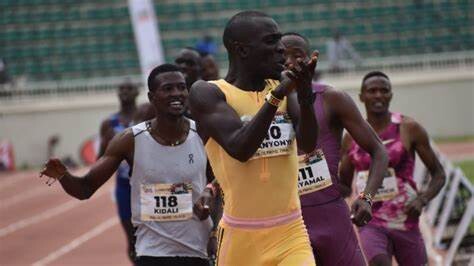
Rudisha, who knows a thing or two about world records, added, “He always shows his bravery and confidence whenever he steps on the track, and that has been the secret behind his success.
“World records are special. We are looking forward to seeing how the young generation is going to take up the challenge. Of course, there is a lot of innovation, and it improves performances. We believe that world records are there to be broken.”
Wanyonyi’s stunning performance in Lausanne has made him a force to be reckoned with in the world of athletics.
His time of 1:41.11 ties him with Kipketer and positions him as the most serious threat to Rudisha’s reign in the 800m. At just 20 years old, Wanyonyi’s rise to the top has been meteoric, and his determination to succeed mirrors that of Rudisha.
Rudisha himself had an illustrious career, beginning as a decathlete before switching to sprints and later focusing on the 800m in 2005. Just a year later, he won the 800m title at the World U20 Championships in Beijing, clocking 1:47.40.
In 2008, he claimed the African senior title in Addis Ababa with a time of 1:44.20. Then, on August 22, 2010, Rudisha set his first world record in Berlin, running 1:41.09 and breaking Kipketer’s 1997 mark.
Seven days later, he improved his record to 1:41.01 in Rieti. Rudisha continued his dominance by winning the world 800m title in Daegu in 2011, reclaiming it in Beijing in 2015, and becoming the first man since Peter Snell to retain the Olympic 800m title in Rio in 2016.
Now, Wanyonyi is carving out his own legacy. At 20, he became the youngest-ever Olympic 800m champion, leading a race of unprecedented depth in Paris.
He held off Canada’s Marco Arop, the reigning world champion, who briefly took the lead off the final turn before Wanyonyi surged back in the final steps. Arop finished with a North American record of 1:41.20 for silver, while Algeria’s Djamel Sedjati claimed bronze in 1:41.50.
Reflecting on his victory, Wanyonyi said, “It was going to be hard to defend as the only Kenyan in the final. I had a lot of pressure. I spoke to Rudisha yesterday, who told me I would win if I employed my tactics. I decided to run the way he did in London. If I had run a slow race, they would have beaten me.”
Although Wanyonyi didn’t quite match Rudisha’s record, he is keen on having another go at it when the Diamond League moves to Silesia, Poland, this Sunday.
While he has remained modest about his world-record ambitions, saying, “Maybe, but not now,” the Diamond League offers the perfect stage for him to make history. The Wavelight technology, which has been instrumental in helping athletes maintain pace, will also be in use, providing Wanyonyi with every opportunity to push the boundaries.
Wanyonyi is no stranger to breaking records. At 19, he shattered the previous one-mile (1,600m) record of 3:56.13 set by American Hobbs Kessler at the World Road Running Championships in Riga, Latvia, last year.
With Rudisha as his role model and mentor, Wanyonyi is poised to continue his upward trajectory and possibly eclipse the mark set by the man he so deeply admires.
As the athletics world watches, the question on everyone’s mind is not if, but when, Emmanuel Wanyonyi will break the 800m world record. And when that day comes, it will be the culmination of a journey inspired by greatness and driven by the relentless pursuit of excellence.
(08/24/24) Views: 111Mark Kinyanjui
Do you know your fitness age?
Here's how your fitness watch can make you feel young again.
Do you ever wish you were 10 years younger? Most new fitness watch technologies allow you to analyze your level of fitness in comparison to the standard for your age and gender–so while you may be 50, depending on how much you train, you might actually have the cardiorespiratory fitness of a 40-year-old. There’s no better feeling than someone (or your watch) thinking you’re younger than you are! Time to strap on your smartwatch, squeeze in an endurance session and get younger.

The technology in your watch measures your VO2 max, or how efficiently your body takes in and uses oxygen during exercise. This value is influenced by factors such as gender and age. Cardiorespiratory fitness naturally declines with age; however, you can still improve your VO2 with regular physical activity to build fitness.
Some devices analyze the intensity of activity, your resting heart rate and body mass index (BMI). You can access the fitness age feature by heading to the health stats section on your watch’s app. If your device doesn’t offer the age feature, you may instead receive a fitness analysis score (poor, fair, average, good, very good or excellent); these stats are still based on your cardiorespiratory fitness compared to the standard for your gender and age group.

Studies have validated that that the technology in most smartwatches provides a sound measure of cardiorespiratory fitness in users. If your score is lower or age is higher than desired, the feature provides you with a better idea of where you are in relation to your goal fitness, and gives you a more objective measure of progression.
If you’re still looking to make progress toward your fitness goals, HIIT, interval training and endurance training are all effective ways of improving your VO2 max. Doing physical activity with a high intensity to increase your heart rate to 70-85 per cent of your max heart rate will help bring you closer to achieving your goals.
(08/23/24) Views: 107Cameron Ormond











